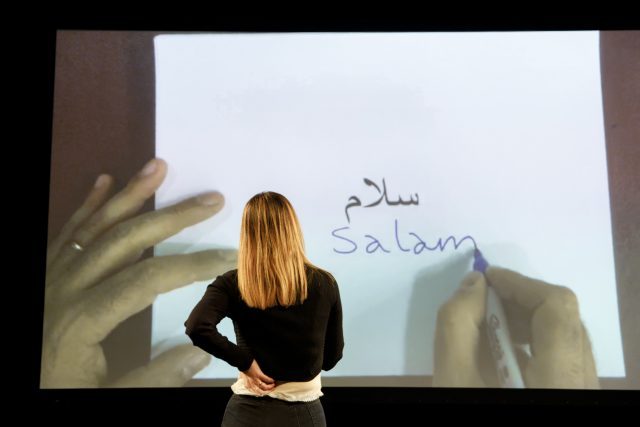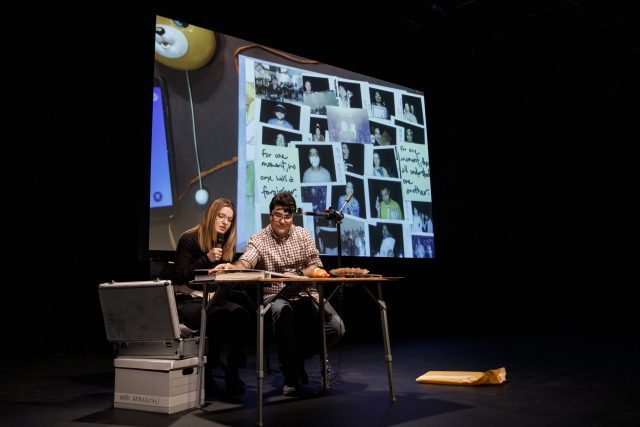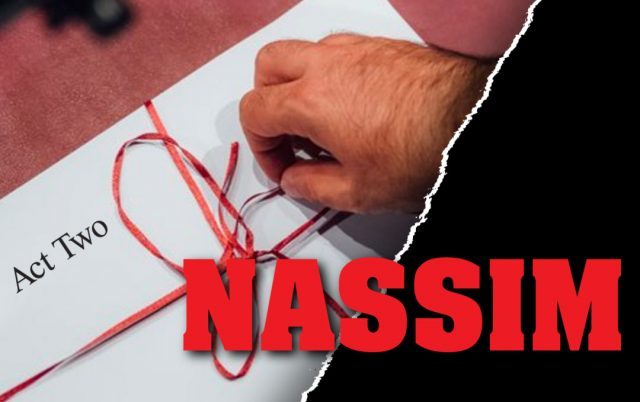
Iranian playwright Nassim Soleimanpour says hello to guest actor Kate Arrington in autobiographical play at City Center (photo by Joan Marcus)
New York City Center, Stage II
130 West 56th St. between Sixth & Seventh Aves.
Tuesday – Sunday through April 20, $69-$90
212-581-1212
www.barrowstreettheatre.com
www.nycitycenter.org
Iranian playwright Nassim Soleimanpour has followed up his international hit, White Rabbit Red Rabbit, in which each show was performed by a different actor reading a script that they hadn’t rehearsed or seen before, with another twist on the standard theatrical experience. Nassim, which opened tonight at City Center’s intimate Stage II, is a delightful and moving autobiographical work about language, heritage, and the deep need for artists to tell stories. And, as with White Rabbit Red Rabbit, the less you know about it going in, the more wonderful the surprises are. Soleimanpour, who was born and raised in Iran and now lives in Berlin, arrived in the United States on a working artist visa on December 4; the play, presented by Barrow Street Theatricals, began the next night and is scheduled to run through April 20. Rhys Jarman’s set is quite simple, consisting of a microphone stand on one side, a chair and a desk on the other, and a white screen at the back. A box on the desk contains information for the guest actor, whose name is not revealed until you enter the theater; among those who either have already performed or are scheduled to are Kate Arrington, Reed Birney, Michael Chernus, Cush Jumbo, Tracy Letts, Jennifer Lim, Tedra Millan, Brad Oscar, Annie Parisse, Michael Shannon, and Michael Urie. I saw three-time Tony nominee and Obie winner Linda Emond (Homebody/Kabul, Cabaret), who was fabulously warm and engaging, throwing herself fully into the show, which is cheerfully directed by Omar Elerian (The Mill — City of Dreams, Misty).

A guest actor and the playwright take a look at themselves and each other in Nassim (photo by Joan Marcus)
For seventy-five minutes, Emond does what she is told with wit and verve, getting so deeply involved in the proceedings that she was wiping away tears near the end. She doesn’t actually have the script in hand; instead, it is projected onto the screen, a pair of hairy hands turning the pages live. Although she is not supposed to go off-script, she did so a few times, which even Soleimanpour got a kick out of. The central focus is that Soleimanpour has never been able to stage one of his plays in Iran in his native Farsi, a language he has lost contact with; thus, his mother has never seen one of his works. “I’ve become a foreigner in my own mother tongue,” he writes. But by putting this play on in the States, he learns some English while reconnecting with Farsi.

Nassim holds myriad surprises for both the audience and a guest actor (photo by David Monteith-Hodge)
Soleimanpour has mastered this format, incorporating Q&As, photos, and audience interaction, quickly improvising while also cleverly anticipating many reactions. Originally presented at London’s Bush Theatre in July 2017, Nassim feels right at home at City Center; even the producer, the stage manager, and an usher get involved. While a significant part of the fun is watching how the guest actor deals with being put on the spot time and time again — Emond was such a joy, clearly relishing this unusual opportunity — Soleimanpour, whose father was a novelist and his mother a painter, is also sharing an intimate story that we can all relate to, tackling such ideas as human communication, family connection, and the international power of theater. It very much reminded me of Iranian auteur Jafar Panahi’s This Is Not a Film, in which the writer, director, editor, and actor defied a government edict putting him under house arrest and banning him from producing any further movies for twenty years by making a documentary with Mojtaba Mirtahmasb and having colleagues smuggle it out of the country on a USB thumb drive. (Panahi has made several other remarkable films since.) Although Soleimanpour is not under that kind of political scrutiny, his zeal for writing a play in Farsi is inspiring. Ultimately, you’ll leave City Center knowing a little more about the guest actor, a lot more about Soleimanpour, and even a few things about yourself, along with a hunger for tomatoes. Oh, and you’ll also immediately want to call your mother.